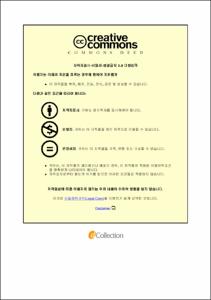정년은퇴시기 평생학습자의 평생학습 참여동기가 삶의 행복감에 미치는 영향
- Alternative Title
- The Influence of Lifelong Learning Participation Motivation of Lifelong Learner in Retirement Age on Life Happiness
- Abstract
- This study examines how lifelong learning participants' motivation to participate in lifelong learning during retirement influence the happiness of life, helping them to plan retirement and life after retirement .
The subject of this study was for those aged 55 to 65 years of age who are living learning or learning experience at a lifelong learning institution located in the area around Busan City and the nearby area of retirement. A total of 250 people were surveyed and the final 203 of the 210 respondents were used for analysis.
Using the SPSS 22.0 statistical program to the questionnaire collected for this study t- verification, member dispersion analysis and post-verification and simple regression analysis of Scheffe was conducted to derive the following findings.
First, there was no significant difference in lifelong learning participation motivation according to the general background characteristics of lifelong learners.
Second, the difference in life happiness based on the general background characteristics of lifelong learners during retirement age showed a significant difference in retirement age.
Third, it has been shown that lifelong learners' participation in lifelong learning during retirement age has a static influence on the happiness of life.
Fourth, the sub-variations of lifelong learning participation, learning orientation, activity-oriented, and goal-oriented all have a static influence on self-realization, and the learning-oriented and learning-oriented types have a static influence on immersion and pleasure.
Through this study, such as the above, the general background variations of lifelong learning participants during retirement age are not a big driver of participation, but the euphoria of life is feeling the happiness of life by a variety of individual differences, and feeling the euphoria through the participation of lifelong learning, it can be seen that the euphoria of self-realization is the most preferred. As a result, retirees can prepare for lifelong learning participation activities as an alternative to pursuing a happy life after retirement, and countries and lifelong learning stakeholders will need to develop and spread in-depth programs and conditions that allow them to work and enjoy their activities, taking into account various factors about the happiness of their lives.
Key word : Retirement age, Lifelong Learner, Lifelong Learning Motivation, Happiness in Life
본 연구는 정년은퇴시기 평생학습참여자의 평생학습 참여동기가 삶의 행복감에 어떠한 영향을 미치는지를 살펴보고 이를 통하여 정년은퇴 도래자의 은퇴준비와 은퇴이후의 삶에 대한 계획을 갖는데 도움을 주고자 한다.
본 연구의 대상은 부산시와 인근의 지역에 위치하고 있는 평생학습기관에서 평생학습중이거나 학습경험이 있는 자들로 은퇴시기 연령에 해당하는 55세~65세의 연령인자를 대상으로 하였다. 총 250명을 대상으로 설문조사를 실시하였으며 응답자 210명 중 최종 203명을 분석에 사용하였다.
본 연구를 위해 수집된 설문지를 SPSS 22.0 통계프로그램을 이용하여 t-검증, 일원분산분석과 Scheffe의 사후검증 그리고 단순회귀분석과 다중회귀분석을 실시하여 다음과 같은 연구결과를 도출하였다.
첫째, 평생학습자의 일반적 배경 특성에 따른 평생학습 참여동기의 차이에는 유의미한 차이가 없는 것으로 나타났다.
둘째, 정년은퇴시기 평생학습자의 일반적 배경 특성에 따른 삶의 행복감의 차이는 정년은퇴 여부별로 유의미한 차이가 있는 것으로 나타났다.
셋째, 정년은퇴시기 평생학습자의 평생학습 참여동기는 삶의 행복감에 정적으로 유의미한 영향을 미치는 것으로 나타났다.
넷째, 평생학습 참여동기의 하위변인인 학습지향, 활동지향, 목표지향은 모두 자아실현에는 정적인 영향을 미치고 학습지향형은 자신감, 목표지향형과 학습지향형은 몰입감과 쾌락적 즐거움에 정적인 영향을 미치는 것으로 나타났다.
이상과 같은 연구 결과를 통하여 정년은퇴시기 평생학습 참여자의 일반적 배경 변인은 참여동기에는 큰 동인은 되지 않으나 삶의 행복감에는 다양한 개인차로 행복감을 느끼고 있다. 또한 평생학습의 참여동기는 삶의 행복감에 영향을 미치고 있고 그 중 자아실현의 행복감을 가장 선호하고 있다는 것을 알 수 있다. 이러한 결과로 정년은퇴시기자는 은퇴 이후 행복한 삶을 추구하기 위한 하나의 대안으로 평생학습 참여활동을 위한 여건을 마련 준비할 수 있고, 국가나 평생학습 관련자는 이들의 삶의 행복감에 대한 다양한 요인을 감안하여 이들이 활동하고 즐겨 가까이 할 수 있는 여건과 심도 있는 프로그램 등을 개발하여 확산하여야 할 것으로 보인다.
주제어 : 정년은퇴시기, 평생학습자, 평생학습 참여동기, 삶의 행복감
- Issued Date
- 2020
- Awarded Date
- 2020. 8
- Type
- Dissertation
- Publisher
- 부경대학교
- Alternative Author(s)
- Chun Kap Won
- Affiliation
- 부경대학교 교육대학원
- Department
- 교육대학원 평생교육·인적자원개발전공
- Advisor
- 주동범
- Table Of Contents
- Ⅰ. 서론 1
1. 연구의 필요성 및 목적 1
2. 연구문제 7
3. 용어의 정의 7
가. 정년은퇴시기 7
나. 평생학습자 8
다. 평생학습 참여동기 8
라. 삶의 행복감 9
4. 연구의 제한점 9
Ⅱ. 이론적 배경 10
1. 정년은퇴시기 10
가. 정년은퇴의 정의 10
나. 정년은퇴 시기자의 특성 13
다. 우리나라 정년은퇴 제도의 문제점 18
2. 평생학습 참여동기 20
가. 평생학습 20
(1) 평생학습의 정의 20
(2) 정년은퇴시기자의 평생학습의 필요성 22
(3) 평생학습자의 참여 저해요인 25
나. 평생학습 참여동기 28
3. 삶의 행복감 33
가. 삶의 행복감의 정의 33
나. 삶의 행복감의 구성 요인 39
다. 정년은퇴 이후 삶의 행복감 44
4. 평생학습 참여동기와 삶의 행복감의 관계 46
5. 선행연구의 고찰 48
가. 평생학습 참여동기와 삶의 행복감에 관한 선행연구 48
나. 삶의 행복감에 관한 선행연구 50
Ⅲ. 연구방법 53
1. 연구대상 및 절차 53
2. 측정도구 55
가. 평생학습 참여동기 척도 55
나. 삶의 행복감 척도 57
3. 자료처리 방법 58
Ⅳ. 연구결과 59
1. 변인의 기술통계 분석 59
2. 일반적 특성별 평균차이 검증 60
3. 변인 간 상관분석 72
4. 평생학습 참여동기가 삶의 행복감에 미치는 영향 73
5. 평생학습 참여동기 하위변인이 삶의 행복감에 미치는 영향 74
6. 평생학습 참여동기 하위변인이 삶의 행복감 하위변인에 미치는 영향 75
Ⅴ. 논의 및 결론 80
1. 논의 80
2. 결론 87
참고문헌 91
Abstract 100
부록(설문지) 102
1. 평생학습 참여동기 105
2. 행복감 107
- Degree
- Master
- Appears in Collections:
- 교육대학원 > 평생교육인적자원개발전공
- Files in This Item:
-
-
Download
 정년은퇴시기 평생학습자의 평생학습 참여동기가 삶의 행복감에 미치는 영향.pdf
기타 데이터 / 848.08 kB / Adobe PDF
정년은퇴시기 평생학습자의 평생학습 참여동기가 삶의 행복감에 미치는 영향.pdf
기타 데이터 / 848.08 kB / Adobe PDF
-
Items in Repository are protected by copyright, with all rights reserved, unless otherwise indicated.